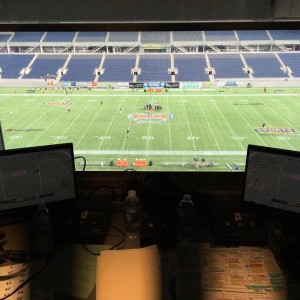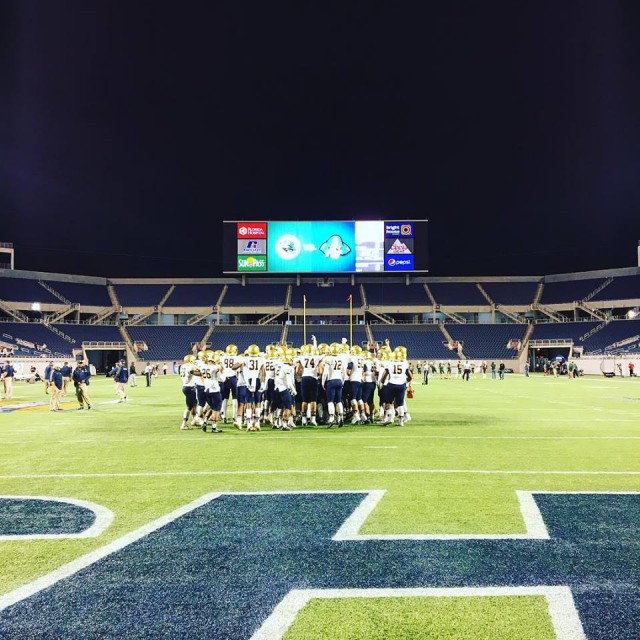 You’re either going to get really tired of this, or you’re not going to be able to get enough of it as the topic of postseason qualification and its proposed changes take center stage during the summer. We presented the basics to you last week, and this week we bring you some perspectives from a couple of a coaches that are in favor of a change. Although the changes are far from being ratified, they’ve got people talking–talking so much that this is lapping the school choice bill in terms of the amount of dialogue.
You’re either going to get really tired of this, or you’re not going to be able to get enough of it as the topic of postseason qualification and its proposed changes take center stage during the summer. We presented the basics to you last week, and this week we bring you some perspectives from a couple of a coaches that are in favor of a change. Although the changes are far from being ratified, they’ve got people talking–talking so much that this is lapping the school choice bill in terms of the amount of dialogue.
The issue at hand is that the postseason in Florida is inherently flawed. That much we can agree upon. How to fix it, is another. There are 2-8/3-7 teams making the playoffs while 5-5 teams are district champions ahead of 7-3 teams. The state title games have become more like sacrifices up-and-down the classes and attendance has proven that. We are getting better games in the first two rounds than the last two, which is counterintuitive.
The FHSAA recently sent out a powerpoint presentation that outlined radical changes to the way teams qualify for the postseason based on a points system that Nebraska uses and modified to fit ours. It eliminates districts, calls for a seeding process and even a week eleven ESPN-style announcement from the FHSAA’s offices in Gainesville setting up the matches.
Teams would earn points based on the records of their opponents during the course of the current season. Of note, there are some coaches–and media–that initially thought this would be based on previous years’ records, but with that approach, there would be significant amounts of guesswork when having to set up the schedules. The reason that’s important, is using previous years’ records versus current can mean as much as a 50-point swing and either knock a team out or put them at a top seed. So there’s one point that all coaches and administrators have to get on the same page about to start.
The second point of contention is the proposal of bonus points. Each team would get one-point per class they jumped up to play, thus hurting the teams in Florida’s highest classification, 8A. It also would open Pandora’s Box for teams in lower classifications to feast on 1-2 win teams in 7A and 8A, but that’s another piece that will come out later today. We talked about the idea of bonus points with Manatee’s Defensive Coordinator, Chad Choate last week and got his thoughts about the new system almost immediately after it had broken.
 “The one thing about the bonus points is for me personally at the end of the day, if 8A as a whole can’t get the same bonus points, then we’re all on the same playing field,” said Choate. “We play a 7A team, and if they beat us, it could effect their status at the end of the season, but it wouldn’t do anything for us. To me if you’re 8A, I guess it is what it is.”
“The one thing about the bonus points is for me personally at the end of the day, if 8A as a whole can’t get the same bonus points, then we’re all on the same playing field,” said Choate. “We play a 7A team, and if they beat us, it could effect their status at the end of the season, but it wouldn’t do anything for us. To me if you’re 8A, I guess it is what it is.”
Choate’s stance is that in order to keep the idea of bonus points, then you’ve got to reward the teams at the highest class to step “up” so-to-speak and play the best-of-the-best.
“I made a suggestion that since 8A is the one that kind of gets the raw end of the deal in terms of the bonus, why don’t we reward extra points for scheduling and playing a champion from the previous season. If you play a St. Thomas Aquinas or a Miami Central, you get rewarded for beating teams of that caliber. At the end of the day, there’s only so many teams that can earn that bonus, though.”
One thing that is apparent from crunching numbers from the 2015 season in search for hypotheticals using the given formula, is that you can earn as many points for losing to elite teams, as you can for beating teams above you in a classification. The number value for losing to an “elite” team that’s won better than 80% of its games is 35 points–the same number of points given to beating a 1-2-3 win team from Class 8A. This could–emphasis on could–lead to a Pandora’s Box situation bonus points or not.
“What I don’t like about necessarily is that you shouldn’t get the bonus points for playing teams from upper classifications that finish 1-9 or 2-8 or even 0-10. I think you should get 30 points period, and that way it would encourage guys to go and schedule teams–even if they’re in you’re own backyard–to put really good teams on their schedule because even if they lose, they would still earn more points than beating a one or two win team.”
One thing that we shouldn’t kid ourselves about is that Manatee’s approach to scheduling is immune to these changes in a sense, because the ‘Canes schedule one of the toughest regular seasons year-in, year-out that they can find in order to gear themselves up for the postseason.
“For us, though–we do this anyways. We schedule the Armwood’s, we leave the state to play Hoover and Hewitt-Trussville and play teams like Venice and Palmetto. We do this with our non-district schedule to start. It’s not going to change anything for us, we want to play the best. I’ve been screaming since we got out of 7A that we should play St. Thomas Aquinas–I mean, what have we got to lose?”
 Even though there are coaches taking opposite sides on the issue, the vast majority are coming to a consensus on one thing. Change is needed. Change is good, especially when change can open up doors to play games that we’ve been waiting to see for almost a decade or more.
Even though there are coaches taking opposite sides on the issue, the vast majority are coming to a consensus on one thing. Change is needed. Change is good, especially when change can open up doors to play games that we’ve been waiting to see for almost a decade or more.
“I’m all for the change,” said Choate. “I like change–I like to change things up and make it a little different and sure, there’s maybe some kinks that need to be worked out, you can see where teams that were 3-7 the previous season might have some trouble finding teams to play them, but at the same token, there’s going to be plenty of other 3-7 teams looking as well. There may be conferences created that help this. In Manatee County, they could say all five public schools play each other and then we’ve got six other games to go an pick.”
Staying on-theme, Plant Head Coach Robert Weiner believes that something had to be done. Although we spoke to him a mere couple of days from the proposal being introduced, you can bet he and his staff were crunching the numbers and assessing the changes.
“I think it was a long time overdue to look at it and suggest changes and I am really pleased that they’re are taking at look at it. Now I know there’s a few more details and a little bit of minutia to look at as well, some of that will be more difficult to work through than other aspects, but I’ve looked at it carefully.”
One point that Weiner addressed that hadn’t been overly discussed in the immediate buzz created by the FHSAA’s proposal, is one that is perhaps one of the biggest–if not THE biggest–that folks have. Plant’s not the only ones in the situation, but having a system in place that essentially eliminates the top programs in the early rounds is sorta-kinda opposite to what should be happening.
“I’ve also looked at it in years’ past–just thinking out loud–what are some of the ways we can make this postseason a little bit better?” Weiner goes on to say. “I look at our own situation and over the past five years, we have played in the second round those last five years either Dr. Phillips or Lakeland. I look at that, and every single year, both of those teams were ranked in the top five of their class, some years in the top three.”
To which folks NOT named Plant, Armwood or Manatee would say–cry me(us) a river–but Weiner’s perspective is valid whether you or us like it. And let’s not kid ourselves, when it comes time to play, the great teams aren’t going to care, and the aforementioned programs at the beginning of the paragraph are still going to feel that way. But they are just a small sample-size. There’s plenty of other schools that feel this way. Schools that are perhaps on the cusp of becoming state powerhouses, but are not benefitting from the archaic system that now exists.
“You know honestly, we’ve won four state championships, we want to win state championships and at the end of the day it doesn’t matter who’s in the first, second, third round–at the end of the day, you either win a state championship or you don’t. The thing is though, when your kids work and are good enough to be a third-fourth-fifth round team rather than a second round-and-out team, it just seems like there’s a system that eliminates those good teams early and that’s not feasible. Neither Plant nor Lakeland should have been out in the second round last year. Dr. Phillips and Plant went 2-2 over those four years we played in the second round and the home team won. Neither of those two teams deserved to be eliminated in round two in any of those four years.”
Again, it’s not about Plant–it’s about having a system that ensures competitive balance and asks more of the teams as they advance, not less. Which is exactly what is happening at the moment.
“I just think that high school football in the state of Florida is so competitive, it’s so hard to be competitive at the top levels to begin with–but to get to the playoffs and be in a system in which you are playing teams that aren’t based upon any merit, but based upon solely on geography–based on numbers that aren’t necessarily pertinent such as total populations at the school along with numbers of teams uneven in districts and so on, it’s a bit foolhardy to stifle the competition that COULD take place.”
Playing away because of lines on the bracket–5-5 or worse teams making the playoffs–or 5-5 teams as district champions and 7-3 teams as runners-up. These are the kinds of things that drive the fans and players and coaches alike crazy. Weiner and Plant inherently understand why things are done the way they are in the state due to the tough financial times. He knows that it’s bigger than just “their” concerns and concerns in general with all things ON the football field.
Still, it doesn’t take away the fact that in a state that produces talent on the football field as well as it grows citrus or serves as a tourist destination and you’ve got to make sure the production process is as efficient as possible. In other words, Florida is pretty important on the food chain in the sport, VERY important–but you’d also need an advanced degree or doctorate in order to explain what should be easily explained. It’s perhaps THE ONE biggest gripe we’ve heard, especially the past five or six years once it’s time to play for a title.
“The truth is if you really look at it down the road, there’s been some amazing second or third round games and then you look at the fourth and fifth round games and you’re saying to yourself wait a minute–this matchup is not even close. People who are from out of state come down here and look at it and have no idea what’s going on. Not only that, they’ll ask such questions like, you’re undefeated but you’re having to travel to play you’re next game. To sit and explain that to someone I’d have to ask them if they’ve got fifteen minutes of their life to spare to lay it all out for them.”
So, as you can see–the FHSAA has their work cutout for them to say the least. We’ve mentioned just one side of the argument and wouldn’t be doing the issue full-justice without dissenting opinions presented–and plenty of dissenting opinions are out there even though we’ve heard plenty in favor. Plant and Manatee undeniably represent the “upper class” when it comes to high school football in this state. That’s not an opinion, it’s fact. But there’s plenty of other schools that feel as though they’re not even remotely close to rowing the same boat as those two schools.
The issue doesn’t address schools specifically like Wiregrass Ranch, who would benefit significantly form playing a Hillsborough-heavy schedule such as theirs is now, but what happens when they get reclassified upon completion of the new high school being built in the Wesley Chapel area in a few years? What happens if they’ve got to play ONLY Pasco County teams? Wiregrass isn’t the only team in that situation, but we can promise you that we will hear from those coaches–and present those feelings to you in the next installment of this process–a process that many are calling the biggest issue in the sport–more so than school choice.
